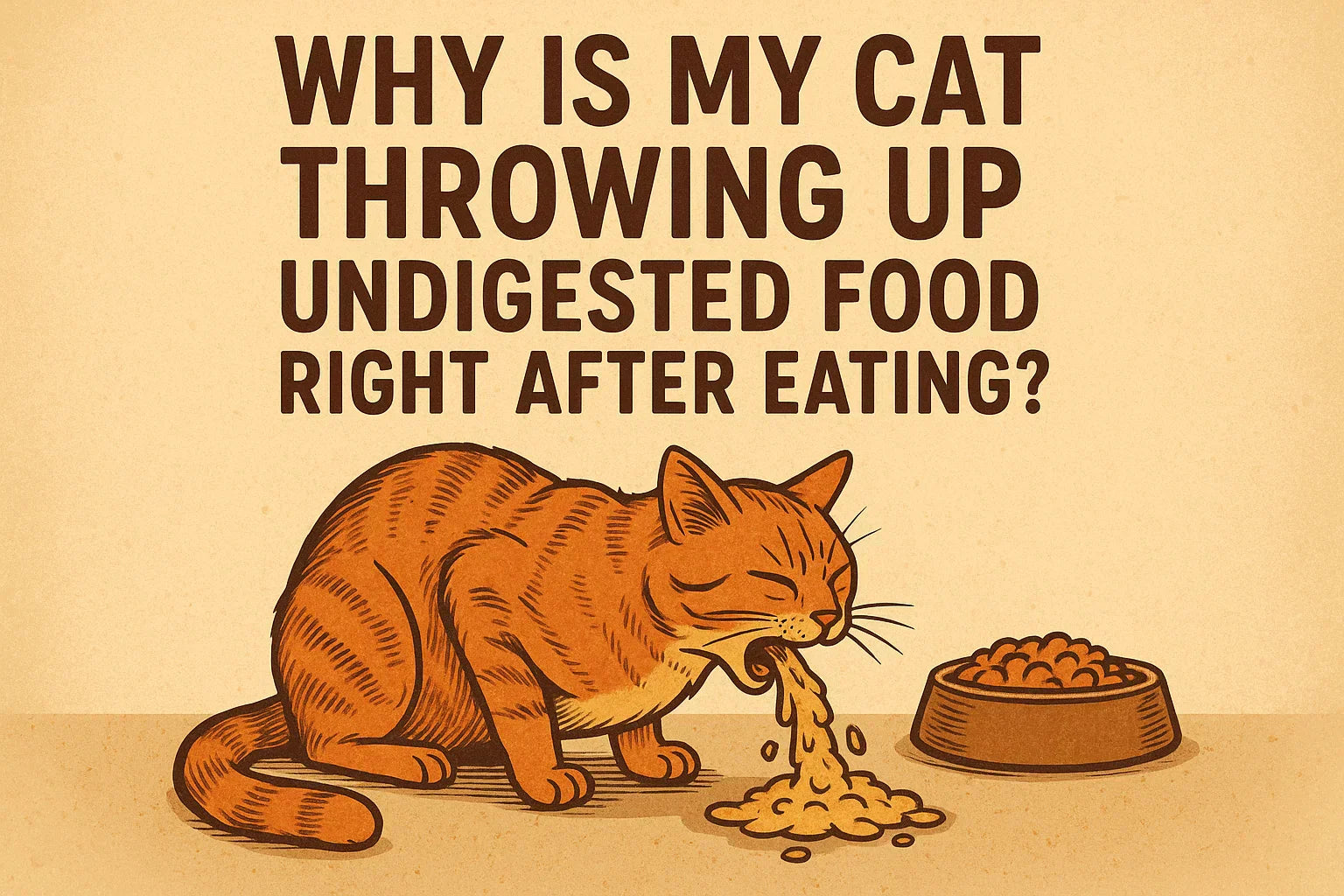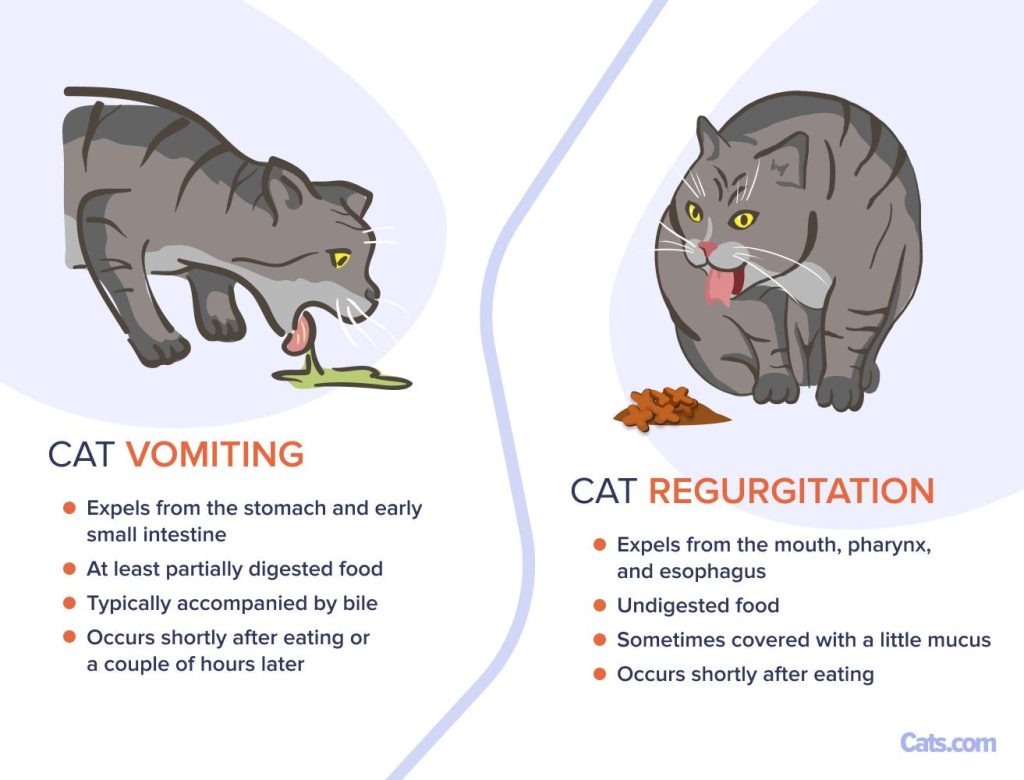Is your cat throwing up undigested food every day? It’s upsetting to see your furry friend struggling like this, and you’re probably worried about what it means.
You might wonder if it’s something serious or just a minor issue. Understanding why this happens is the first step to helping your cat feel better. You’ll discover the common reasons behind daily vomiting and what you can do to stop it.
Keep reading—your cat’s health depends on it.
Common Reasons For Daily Vomiting
Seeing your cat throw up undigested food every day can be worrying. Understanding the common reasons behind this behavior helps you take the right steps to ease their discomfort. Let’s look at some of the usual causes that might be triggering daily vomiting in your feline friend.
Dietary Causes
Your cat’s diet plays a big role in their digestive health. Poor-quality food or sudden changes in diet can upset their stomach. Sometimes, foods that are too rich or contain unfamiliar ingredients can be hard for your cat to digest, causing repeated vomiting.
If you recently switched brands or introduced new treats, consider if these changes coincide with the vomiting. Cats often react to additives or fillers in commercial cat food, which might be the culprit behind the upset stomach.
Eating Habits
How your cat eats might surprise you as a cause for vomiting. Cats that eat too fast often swallow a lot of air along with their food. This can lead to regurgitation or vomiting shortly after meals.
Try feeding smaller portions more frequently to slow them down. Using puzzle feeders or spreading food out on a flat surface may also help reduce the speed of eating and ease vomiting.
Food Allergies
Just like people, cats can develop allergies to certain foods. These allergies can irritate the stomach lining and trigger vomiting. Common allergens include beef, dairy, fish, or chicken.
If you notice your cat scratching more, having skin issues, or experiencing vomiting after eating certain foods, an allergy might be the cause. Talk to your vet about trying a hypoallergenic diet or elimination diet to identify the trigger.
Infections And Parasites
Infections from bacteria or viruses can upset your cat’s digestive system. Parasites like worms also cause irritation that leads to vomiting. These health issues often come with other signs such as diarrhea, lethargy, or loss of appetite.
If your cat’s vomiting is persistent, it’s important to get a vet check-up. A simple stool test can detect parasites, and timely treatment can stop the cycle of daily vomiting quickly.

Credit: www.yahoo.com
Health Conditions Linked To Vomiting
Vomiting in cats can signal several health problems. It is important to recognize the causes. Some health conditions make cats throw up undigested food daily. Identifying these conditions helps in seeking timely veterinary care.
Gastrointestinal Disorders
Gastrointestinal disorders often cause frequent vomiting. Issues like gastritis or inflammatory bowel disease irritate the stomach lining. This irritation prevents proper digestion. Food may pass through too fast, leading to vomiting. Parasites and infections also disrupt the digestive tract. Chronic vomiting can result from these problems.
Kidney And Liver Issues
Kidney and liver problems affect digestion and toxin removal. When these organs fail, toxins build up in the bloodstream. This buildup triggers nausea and vomiting. Cats with kidney or liver disease often vomit undigested food. Early signs include loss of appetite and weight loss. Prompt diagnosis is crucial for treatment.
Pancreatic Problems
Pancreatitis is a common pancreatic issue in cats. It causes inflammation and pain in the pancreas. This condition disrupts enzyme production needed for digestion. Without enzymes, food cannot break down properly. Vomiting undigested food becomes frequent. Pancreatic cancer can also cause similar symptoms.
Cancer And Tumors
Cancer in the digestive system can cause vomiting every day. Tumors block or irritate the stomach and intestines. This obstruction prevents normal digestion and movement of food. Cats with tumors often vomit undigested food. Other signs include weight loss and lethargy. Early veterinary checkups can detect these issues.
Behavioral And Environmental Factors
Behavioral and environmental factors can play a big role in why your cat is throwing up undigested food every day. Cats are sensitive creatures, and changes in their surroundings or emotional state might directly affect their digestion. Understanding these factors can help you spot the root cause and create a calmer, safer space for your feline friend.
Stress And Anxiety
Stress is a common trigger for vomiting in cats. If your cat feels threatened or anxious, their digestive system can become unsettled, leading to frequent vomiting of undigested food.
Think about recent changes around your home—new pets, loud noises, or even a new furniture arrangement. These can make your cat uneasy without you realizing it.
Have you noticed your cat hiding more or acting restless? These behaviors often accompany stress and might explain the vomiting.
Toxic Substances
Your cat might ingest harmful substances without you knowing, causing stomach upset and vomiting. Household plants, cleaning products, or even certain human foods can be toxic and lead to digestive distress.
Check if your cat has access to places where these items are kept. Even small amounts of toxins can cause your cat to vomit undigested food repeatedly.
Are you sure your home environment is completely safe? Sometimes the answer lies in subtle risks that go unnoticed.
Changes In Routine
Cats thrive on routine, and sudden changes can disrupt their digestive balance. Altered feeding times, new diets, or changes in their daily schedule may cause your cat’s stomach to react negatively.
For example, switching cat food abruptly or skipping meals can result in vomiting undigested food. Your cat’s stomach needs consistency to function properly.
Ask yourself: Have you recently changed your cat’s routine or diet? Small adjustments might help reduce the vomiting episodes.

Credit: stellarnook.com
When To See A Veterinarian
Noticing your cat throwing up undigested food every day can be alarming. Knowing when to see a veterinarian is crucial to avoid worsening your cat’s condition. Early intervention often leads to better outcomes and less stress for both you and your feline friend.
Warning Signs
Some signs mean you should seek veterinary care immediately:
- Repeated vomiting lasting more than 24 hours
- Presence of blood or unusual color in the vomit
- Loss of appetite or lethargy
- Weight loss or dehydration
- Signs of pain or discomfort, like hiding or vocalizing
Ignoring these symptoms can lead to serious health issues. Have you noticed any of these signs alongside your cat’s vomiting?
Diagnostic Tests
Your vet will start with a thorough physical exam and review your cat’s history. They may recommend tests such as:
- Blood work to check organ function and infections
- X-rays or ultrasound to look for blockages or abnormalities
- Fecal tests to rule out parasites
- Endoscopy for a closer look inside the digestive tract
These tests help pinpoint the cause so your cat receives the right treatment. Remember, accurate diagnosis is the first step to recovery.
Treatment Options
Treatment depends on the underlying cause. Your veterinarian might suggest:
- Medications to control nausea and inflammation
- Diet changes, such as easily digestible food or prescription diets
- Hydration therapy if your cat is dehydrated
- Surgery in case of foreign object obstruction or severe conditions
Every cat responds differently, so follow your vet’s advice closely. Have you prepared a list of questions for your vet to ensure you cover all concerns?
Home Care Tips For Vomiting Cats
Seeing your cat vomit undigested food daily can be alarming, but some home care steps can ease their discomfort. Adjusting their diet, managing hydration, and creating a safe space are practical ways to support your cat’s recovery. You might be surprised how small changes in your routine make a big difference for your feline friend.
Diet Adjustments
Switch to smaller, more frequent meals instead of one or two large portions. This helps your cat digest food better and reduces the chance of vomiting.
Try feeding easily digestible foods like boiled chicken or special veterinary diets designed for sensitive stomachs. Avoid giving your cat rich or fatty treats, which can trigger vomiting.
Have you noticed if certain foods cause more vomiting? Keeping a food diary can help identify and eliminate problem items.
Hydration And Feeding Schedule
Make sure fresh water is always available. Dehydration can worsen vomiting and delay recovery.
Feed your cat at consistent times daily to regulate their digestive system. Sudden changes in feeding times may upset their stomach.
If your cat tends to eat too fast, try using a slow feeder bowl or spreading food on a flat surface. Slowing down eating can prevent gagging and vomiting.
Safe Environment
Reduce stress in your cat’s environment, as anxiety can worsen vomiting. Provide quiet resting spots away from noise and activity.
Check that your cat isn’t ingesting non-food items like plants, strings, or small toys that could cause digestive upset.
Have you noticed your cat vomiting more after stressful events? Creating a calm space might be the key to fewer episodes.
Preventing Future Vomiting Episodes
Preventing your cat’s daily vomiting of undigested food requires careful attention. Small changes in care can make a big difference. Watch your cat closely and take steps to keep the stomach calm and healthy. Avoid triggers that upset digestion and cause vomiting. Focus on good habits that support your cat’s overall wellbeing.
Regular Vet Checkups
Take your cat to the vet often. Regular visits help catch health issues early. The vet can check for infections or allergies that cause vomiting. Keep vaccinations and parasite control up to date. Early treatment prevents problems from worsening. Share any changes in your cat’s behavior or eating habits with the vet.
Balanced Nutrition
Feed your cat a healthy, balanced diet. Use high-quality cat food made for sensitive stomachs. Avoid sudden changes in food type or brand. Feed smaller meals several times a day. This helps digestion and reduces vomiting risks. Fresh water should always be available. Avoid giving human food or treats that upset the stomach.
Managing Stress
Stress can cause your cat to vomit more often. Keep your cat’s environment calm and safe. Provide quiet resting spots and cozy bedding. Use toys and playtime to reduce anxiety. Avoid loud noises and sudden changes at home. Consider pheromone diffusers to help your cat relax. A calm cat digests food better and vomits less.
Credit: www.usatoday.com
Frequently Asked Questions
Why Is My Cat Vomiting Undigested Food Daily?
Daily vomiting of undigested food may indicate digestive issues, food allergies, or rapid eating. Consult a vet for proper diagnosis and treatment.
Can Food Allergies Cause My Cat To Vomit Frequently?
Yes, food allergies can trigger frequent vomiting in cats. Identifying and avoiding allergens helps reduce symptoms and improves your cat’s health.
How Does Rapid Eating Lead To Undigested Vomiting?
Rapid eating causes cats to swallow air and large food chunks. This leads to poor digestion and frequent vomiting of undigested food.
When Should I See A Vet For My Cat’s Vomiting?
If your cat vomits daily, shows lethargy, weight loss, or dehydration, see a vet immediately for proper care and treatment.
Conclusion
Cats vomiting undigested food can worry pet owners. It’s essential to watch for patterns. Frequent vomiting might signal a health issue. Food allergies or digestive problems could be the cause. Consulting a vet ensures your cat’s health. Simple changes in diet can sometimes help.
Always prioritize your pet’s well-being. Don’t delay seeking professional advice. Your cat deserves a happy, healthy life. Regular vet visits keep potential issues in check. Understanding your cat’s needs is key. Stay observant and proactive. Peace of mind comes from caring.
Your cat’s comfort is worth the effort.

